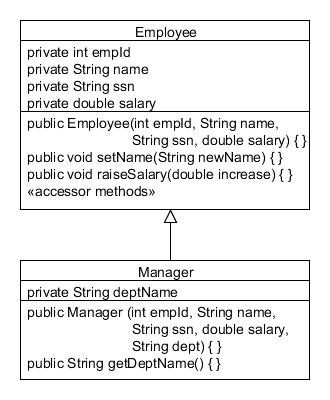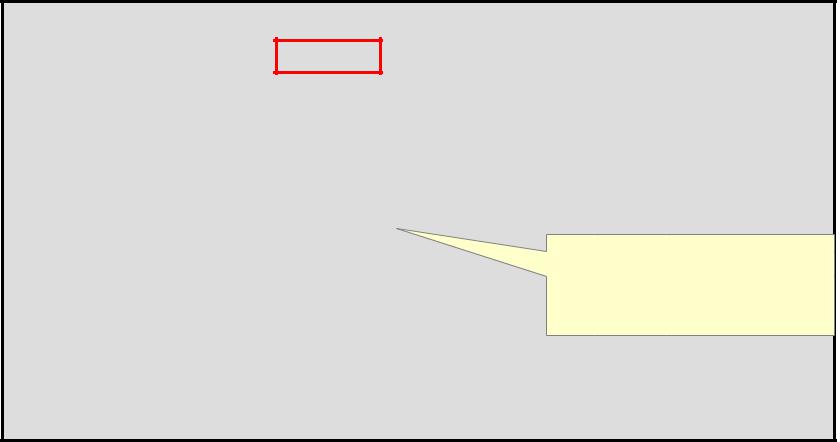
Lectures / lecture3_1
.pdf
Employee Class Refined
package com.example.domain; public class Employee {
//private fields ...
public Employee () {
}
//Remove all of the other setters public void setName(String newName) {
if (newName != null) { this.name = newName;
}
}
public void raiseSalary(double increase) { this.salary += increase;
}
}
Encapsulation step 2: These method names make sense in the context of an Employee.

Make Classes as Immutable as Possible
package com.example.domain; |
Encapsulation step 3: |
|
Replace the no-arg |
||
|
||
public class Employee { |
constructor with a |
|
// private fields ... |
constructor to set the |
// Create an employee object |
value of all fields. |
|
|
public Employee (int empId, String name, |
|
String ssn, double salary) { |
|
this.empId = empId; |
|
this.name = name; |
|
this.ssn = ssn; |
|
this.salary = salary; |
|
} |
|
public void setName(String newName) { ... } |
|
public void raiseSalary(double increase) { ... } |
|
} |
|

Creating Subclasses
You created a Java class to model the data and operations of an Employee. Now suppose you
wanted to specialize the data and operations to describe a Manager.
1package com.example.domain;
2public class Manager {
3private int empId;
4private String name;
5private String ssn;
6private double salary;
7private String deptName;
8public Manager () { }
9// access and mutator methods...
10}

Subclassing
•In an object-oriented language like Java, subclassing is used to define a new class in terms of an existing one.
superclass: Employee ("parent" class)
this means "inherits"
subclass: Manager, is an Employee
("child" class)

Manager Subclass
package com.example.domain;
public class Manager extends Employee { private String deptName;
public Manager (int empId, String name,
String ssn, double salary, String dept) { super (empId, name, ssn, salary);
this.deptName = dept;
}
public String getDeptName () { return deptName;
The super keyword is used to call the constructor of the parent class. It must be the first statement in the constructor.
}
// Manager also gets all of Employee's public methods!
}
Constructors Are Not Inherited
Although a subclass inherits all of the methods and fields from a parent class, it does not inherit constructors. There are two ways to gain a constructor:
–Write your own constructor.
–Use the default constructor.
•If you do not declare a constructor, a default no-argument constructor is provided for you.
•If you declare your own constructor, the default constructor is no longer provided.

Using super in Constructors
To construct an instance of a subclass, it is often easiest to call the constructor of the parent class.
–In its constructor, Manager calls the constructor of
Employee.
super (empId, name, ssn, salary);
–The super keyword is used to call a parent's constructor.
–It must be the first statement of the constructor.
–If it is not provided, a default call to super() is inserted for you.
–The super keyword may also be used to invoke a parent's method or to access a parent's (non-private) field.

Constructing a Manager Object
Creating a Manager object is the same as creating an Employee object:
Manager mgr = new Manager (102, "Barbara Jones", "107-99-9078", 109345.67, "Marketing");
–All of the Employee methods are available to
Manager:
mgr.raiseSalary (10000.00);
–The Manager class defines a new method to get the Department Name:
String dept = mgr.getDeptName();

What Is Polymorphism?
The word polymorphism, strictly defined, means “many forms.”
Employee emp = new Manager();
–This assignment is perfectly legal. An employee can be a manager.
–However, the following does not compile:
emp.setDeptName ("Marketing"); // compiler error!
–The Java compiler recognizes the emp variable only as an Employee object. Because the Employee class does not have a setDeptName method, it shows an error.

Overloading Methods
Your design may call for several methods in the same class with the same name but with different arguments.
public void print (int i) public void print (float f) public void print (String s)
–Java permits you to reuse a method name for more than one method.
–Two rules apply to overloaded methods:
•Argument lists must differ.
•Return types can be different.
–Therefore, the following is not legal:
•public void print (int i)
•public String print (int i)
